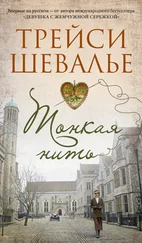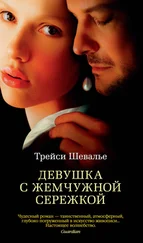Mummy smiled. “You didn’t think that when you first met me. Anyway, when I get out I will have far too much to do to read.”
“We’ll discuss this when you are back home,” Daddy said, glancing at Caroline Black. “You can’t be expected to think properly in here.”
“There’s nothing to discuss. It’s a decision I make. It has nothing to do with you.”
“It has everything to do with me-I’m your husband!”
“Pardon me, Richard, but nothing I’ve done in my little life has had any significance whatsoever until I joined the WSPU.”
“How can you say that in front of Maude?”
Mummy looked at me. She seemed genuinely puzzled. “What about Maude?”
“Are you saying having a child has not been significant?”
“Of course it has. Maude is the reason I’m sitting in this prison cell. I’m doing this so that she will be able to vote.”
“No, you’re doing it so that you can swan about town, feeling self-important, making silly speeches and neglecting your home and family.”
“I do feel important,” Mummy replied. “For perhaps the first time in my life I have something to do, Richard. I’m working! I may not be optimistic like Caroline and the Pankhursts that we’ll see suffrage voted in in my lifetime. But our work will one day lead to it. Maude will see those results, even if I don’t.”
“Oh, climb down from your soapbox!” Daddy cried. “You claim to be doing this for your daughter. Have you ever asked Maude what she thinks of you leaving her all alone like this? Have you?”
Five sets of eyes turned on me. Daddy’s were furious, Mummy’s curious. The two wardresses inspected me without interest. Only Caroline Black’s doglike brown eyes showed any sympathy. I turned red. My stomach was aching.
I took a step backward and then another, and before I knew it I had turned and started to run. “Hey! Stop!” I heard a wardress shout. I continued to run along the gangway, back along the route we had taken-down the stairs, through the courtyard, and along a corridor, accompanied the whole way by shouts from women in gray uniforms, who never managed to catch up with me. I reached a door, opened it, ran to the bench, and fell into Lavinia’s arms.
“Oh, my poor dear,” Lavinia said, patting me on the back as I sobbed. “There, now. There, now. It’s just as well I came. I suppose.”
When we got back from Holloway I went straight to Kitty’s morning room, where she keeps her books. There I saw just how far she has fallen into the black pit that is this cause.
I had been planning to find and burn the Nietzsche, but instead I burned every handbill, every newspaper, every banner, I could lay my hands on.
Poor Richard. I didn’t think I would ever be embarrassed for the chap, but I am. I always said his wife would be a handful.
He and I were on the roster to roll the cricket pitch tonight, and were just walking over to the heath when we saw her. I must say I’m glad Trudy has never asked for a bicycle. Kitty Coleman was riding along merrily, her dress rising to her knees as she pedaled. I caught a good glimpse of an ankle-and a fine one it was too-before I managed to look away.
Richard made as if he didn’t see her, so I pretended not to as well, but then she rang a little bell and we had to raise our hats at her. She waved, then went on her way with a flash of the other ankle.
I thought she was looking remarkably well for having been six weeks in Holloway, but I did not say so to Richard. In fact it seemed best not to say anything at all.
But Richard did, which surprised me, as we’re not ones for confidences. “Tell me, Albert, how do you handle your wife?”
I stumbled over a paving stone. “How do I handle my wife?” With firm affection, I thought, as I regained my balance. I did not say so aloud-there are things men do not say aloud.
“Kitty has blackmailed me,” Richard continued.
“How so?”
“She says that if I try to forbid her to work for the suffragettes she will begin giving speeches at rallies. Can you imagine the Coleman name all over those infernal handbills they pass out? Or plastered on posters, or chalked on the pavement? Holloway almost killed my mother from the shame of it-this would finish her off. What would you do in my situation?”
I was trying to picture Trudy making such a threat, but it was impossible to imagine. If anything she is more concerned about the Waterhouse name than I am. And she would rather eat a plate of coal than speak in public. The kinds of threats she makes to me are to do with the color of the front-parlor curtains or which seaside town we are to go to for a holiday.
Richard was looking at me as if he expected a response. “Perhaps it’s just a phase your wife is going through,” I suggested. “Perhaps the suffragette movement will die out. They’re planning a demonstration in Hyde Park in June, aren’t they? Even Trudy knows of it, and she’s no suffragette. Perhaps that will satisfy them, and afterward your wife will settle down.”
“Perhaps,” Richard repeated, but I am afraid he did not sound convinced.
Maude has been avoiding me for weeks now, ever since I came out of Holloway. At first I didn’t notice, as there was so much to do, what with the march to organize for June. It is to be the largest public gathering of people anywhere, ever in the world. We are run off our feet with tasks-booking trains from all over the country, getting permission for the march routes and use of Hyde Park, conferring with the police, finding speakers and marching bands, making banners. It is like planning a battle. No, not just a battle-an entire war.
On that theme, Caroline has had a wonderful idea of what she and I can dress as for the procession. It is to be very dramatic, and I plan to celebrate my liberation from both Holloway and my despair with a liberating costume. It will be a great day.
In the midst of all the activity, though, I did notice that Maude left rooms as soon as I entered them, and was eating more meals at the Waterhouses’ than at home. Richard simply shrugged when I mentioned this to him. “What did you expect?” he said. It is hard to talk to him now-since I got out of Holloway he has been avoiding me too. Just as well that I have grown a thick skin!
I was not really surprised to see what he had done to my morning room. Other suffragettes’ husbands have done worse. To put an end to such behavior I had to resort to blackmail, which I am not proud of but which was necessary. It worked too-he may hate what I am doing but he fears his mother more.
On Saturday morning I caught Maude moping in the drawing room and had an idea. “Come with me into town,” I suggested. “There’s a motor to take us. See?” I pointed out the window at the Jenkinses’ motorcar sitting in front of the house. Mrs. Jenkins, a wealthy WSPU member in Highgate, has kindly donated it for WSPU business around town. Her husband doesn’t know-we only use it when he’s at work or away-and we have had to bribe Fred, the driver, to keep him quiet. It has been worth every penny.
Maude gaped at the car, which was gleaming in the sun. I could see that she wanted to say yes but felt she shouldn’t.
“Do come,” I said. “It’s a lovely day-we can ride with the top down.”
“Where are you going?”
“To Clements Inn. But not for long,” I added quickly, knowing that she did not like the WSPU. “Then on to Bond Street. Afterward we could stop at the soda fountain at Fortnum and Mason‘s-we haven’t had an ice cream there in such a long time.”
I don’t know why I was trying so hard. I have never been an attentive mother, but now I feel as if I am fighting for something on Maude’s behalf, and want to include her, even if it means bribing her with an ice cream.
Читать дальше
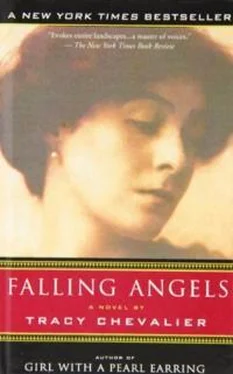



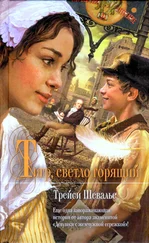

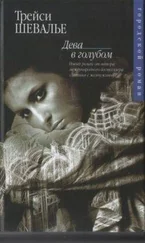
![Трейси Шевалье - Тонкая нить [Литрес]](/books/386177/trejsi-shevale-tonkaya-nit-litres-thumb.webp)



